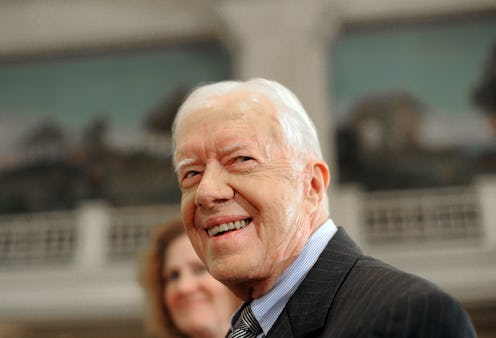News
6 Times Jimmy Carter Showed His Feminism
During the TED Women conference this week in Monterey, California, it was once again made clear that former President Jimmy Carter is a feminist, and he recognizes that women face serious oppression around the world. In a video posted by TED on Twitter, he called on those in positions of influence to speak up and to help affect change. It's far from the first time Carter, 88, has advocated on behalf of women and women's rights, both during his presidency, as well as afterward, through his work on human rights issues with the Carter Center. In the video, Carter said:
Well, what women need to realize is that they are the subject of the worst human rights abuses on earth, in many different ways. And I think that the women, if they speak up, those who are in a powerful position, or in a position of influence, if they'll take the leadership, that'll be the best way to break down the barrier that now exists in women reaching their justifiable rights.
Last year, he flat-out stated he was a feminist, as if it was ridiculous to suggest otherwise, and urged other men to identify themselves as feminists, too. "Yes, of course I consider myself a feminist," he said. "If a feminist is someone who believes that women should not be persecuted and women should have equal rights, then all men ought to be feminists."
Carter feels so strongly about women's rights that despite his status as a Christian and a deacon within his church, he resigned from the Southern Baptist Convention when its leaders voted in 2012 that women should be subservient to their husbands. Carter wrote an essay in which he explained his decision, and called out church leaders for "quoting a few carefully selected Bible verses" to explain their position.
Carter has had a lot of awesome things to say about feminism over the years, and has done more than just talk. Here are five times Carter proved he was serious about equal rights for women and girls:
He Challenged His Church Leaders
"The truth is that male religious leaders have had, and still have, an option to interpret holy teachings either to exalt or subjugate women. They have, for their own selfish ends, overwhelmingly chosen the latter," Carter wrote in his 2014 book A Call to Action: Women, Religion, Violence, and Power. (More on that in a minute).
He told The Huffington Post that there was no evidence that Jesus "did anything except to exalt women. Never has a single word or action been alleged to him that would deprive women from their equal or superior rights."
He Wrote A Book About Women's Rights
Carter said that 2014 book is his most important book yet (he's written more than two dozen). While he describes the kinds of human rights abuses normally associated with third-world countries, such as human trafficking and female genital mutilation, Carter said such horrors exist in countries like the US as well.
He Called Women's Rights "The Fight Of My Life"
Earlier this year, Carter told CNN that the fight for the rights of women around the world would be "the highest priority for the rest of my life." He was inspired by his wife, Rosalynn; his daughter, Amy; and his grandchildren. It was the international work of the Carter Center that showed him how bad things were for women. "[W]e saw clearly the most serious and unaddressed human rights abuse on Earth is among women and girls," he told CNN.
He Proposed Registering Women For The Draft
In 1980, Carter proposed that women should be eligible for the military draft, according to Slate. The Supreme Court ultimately ruled in 1981 that women would not have to register. But Carter made the argument that women were "just as qualified as men" to serve in the military.
He Wrote To The Pope
Carter told NPR that he wrote to Pope Francis and challenged the Catholic Church's position regarding female leaders. He said while he did not expect change to come in the near future, he thought the pope was "much more amenable to changes" than previous pontiffs.
Images: Getty Images (5)
